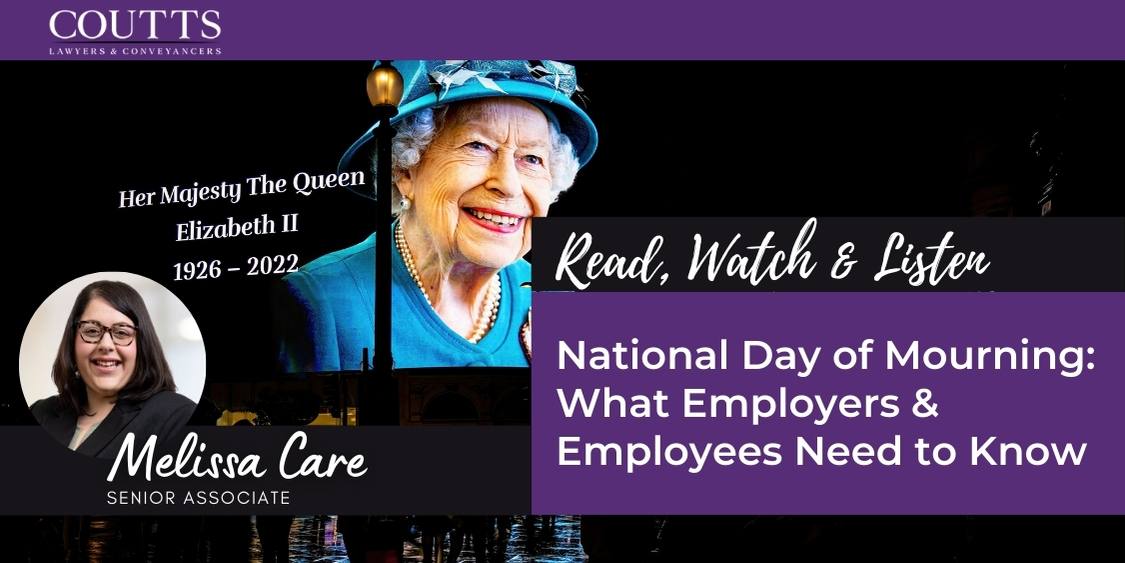KEY TAKE-OUTS:
- The Australian Government have recently announced a one-off public holiday declared as a National Day of Mourning following the death of her Majesty Queen Elizabeth II, scheduled for 22 September 2022.
- Employers are to operate their business based on public holiday requirements, including closing of the business or paying staff public holiday rates depending on the industry and relevant awards/agreements.
- An employee may refuse to work on the public holiday if the request is unreasonable or they have reasonable grounds for the refusal.
What is the national mourning day in Australia?
The Australian Government have declared a nation-wide public holiday to coincide with the National Memorial Service being held on Thursday, 22 September 2022 in honour of her Majesty, Queen Elizabeth II. This one-off public holiday has some employers confused as to how they should operate their business on this day. Although there is no precedent in relation to a one-off public holiday, businesses are urged to operate their business based on the usual public holiday requirements.
Should my business be open on National Mourning Day?
Are public holidays a business day? Since the National Day of Mourning is a public holiday?
banks and financial institutions will be closed for the entirety of the day, and shops and retailers may trade as they normally would on any other public holiday.
If a business is closed on the public holiday, employees (excluding casuals) will be entitled to receive their base rate of pay for the ordinary hours they would have worked had it not been a public holiday.
The base rate of pay does not include:
- Any incentive-based payments
- Bonuses
- Loadings
- Monetary allowances
- Overtime
- Penalty rates
Casual and part-time employees who are not rostered to work on 22 September 2022, will not be entitled to payment for the public holiday.
Some businesses may decide to substitute the public holiday for another day. The public holiday will be treated as an ordinary day of work whilst the public holiday entitlements will be attached to the substituted day. Employees can agree with their Employer to substitute a public holiday if their award or agreement allows it or under the National Employment Standards.
National Day of Mourning for workers
Is 22nd of September a holiday for all employees in Australia?
If a business is to remain open on the public holiday, there must be a reasonable request for the employee to work. An employee may refuse to work on the public holiday if the request is unreasonable or if they have reasonable grounds for refusal including, but not limited to:
- Personal circumstances, ie family responsibilities
- Whether they will receive more pay ie penalty rates
- Whether they are full-time, part-time, casual or shift worker
- The amount of notice in advance of the public holiday when making the request to the employee to work
What Public Holiday Rates and Conditions can employees receive on National Mourning Day?
Awards, enterprise agreements and other registered agreements can provide entitlements for working public holidays, including:
- Extra pay (for example public holiday rates)
- An extra day off or extra annual leave
- Minimum shift lengths on public holidays
- Agreeing to substitute a public holiday for another day.
Employers should ensure that the public holiday pay rates that they pay their employees are accurate and correct in accordance with the relevant award, enterprise agreement or other registered agreement.
Annual leave or sick leave on a public holiday
If an employee is on paid annual or sick leave, they are to be paid for the public holiday instead of their accrued leave if the public holiday falls on a day the employee would usually work.
Public holidays are not to be counted as annual or sick leave and shall not be taken away from an employee’s accrued paid leave.
It is important for employers to be conscious of the provisions within the awards and agreements for their employees. If you are unsure on what your employees are entitled to, please do not hesitate to contact our employment law team to discuss your obligations.
ABOUT MELISSA CARE:
Melissa is a Senior Associate at Coutts Lawyers & Conveyancers working from our Campbelltown Office and has extensive experience in the areas of Civil Disputes & Litigation, Building and Construction Disputes, Commercial Litigation & Employment Law for both corporate clients and individuals.
Melissa holds a Bachelor of Laws, Bachelor of Commerce (Majoring in Marketing), Graduate Law Diploma from the College of Law; and has been admitted to the Supreme Court of NSW and the High Court of Australia.
For further information please don’t hesitate to contact:
Melissa Care
Senior Associate
info@couttslegal.com.au
1300 268 887
This blog is merely general and non-specific information on the subject matter and is not and should not be considered or relied on as legal advice. Coutts is not responsible for any cost, expense, loss or liability whatsoever to this blog, including all or any reliance on this blog or use or application of this blog by you.




